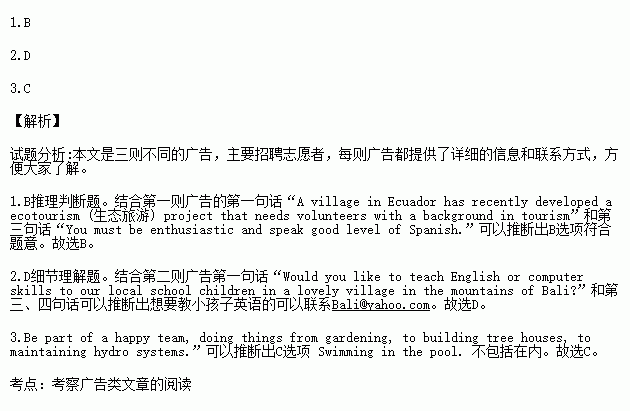题目内容
Volunteers Wanted
Ecuador
A village in Ecuador has recently developed a ecotourism (生态旅游) project that needs volunteers with a background in tourism. This is an unpaid, challenging job that might last one year. You must be enthusiastic and speak good level of Spanish. You will need to cover your food and lodging on your own.
To find out more information, e-mail volunteer@ ecuador.org.
Bali
Would you like to teach English or computer skills to our local school children in a lovely village in the mountains of Bali? There are also western children homeschooling here, some of whom need help with their daily programs. For volunteers of homeschooling, you are required to have baby-sitter experience. Please contact me for more information at Bali@yahoo.com.
Dominica
Experience nature and adventure in Dominica, the island of the Caribbean. Be part of a happy team, doing things from gardening, to building tree houses, to maintaining hydro systems.
For more information please e-mail info@Dominica.com.
1.A college graduate who speaks good Spanish and is interested in ecotourism had better work in ______.
A. an island of Dominica B. a village in Ecuador
C. the mountains of Bali D. a house in Caribbean
2.One who wants to teach small children English will contact ______.
A. volunteer@org B. info@Dominica.com
C. volunteer@ ecuador.org D. Bali@yahoo.com
3.Which is NOT a required task for a volunteer at the island of Dominica?
A. Gardening.
B. Building tree houses.
C. Swimming in the pool.
D. Maintaining hydro systems.
 口算题卡北京妇女儿童出版社系列答案
口算题卡北京妇女儿童出版社系列答案

